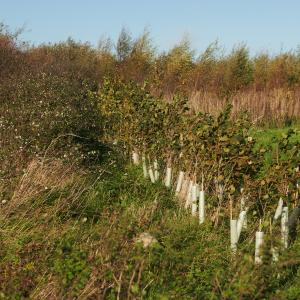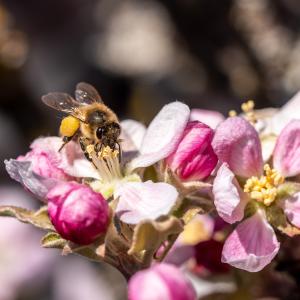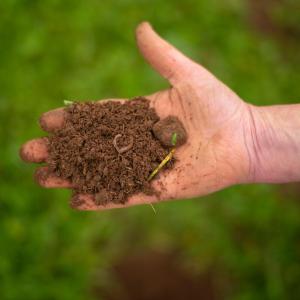Our campaign
The decisions Welsh Government make in the next few years will be crucial in creating a stable and healthy Wales for future generations and protecting us from the worst of the nature and climate crisis.
In 2024 the Senedd (Welsh Parliament) unanimously agreed to support the creation of a new Sustainable Farming Scheme which puts the needs of people, nature and climate at the centre of all future action.
This is vital as unsustainable agriculture is the primary driver of nature loss, with Wales being one of the most nature depleted nations in the world where one in six assessed species is at risk of extinction.

More sustainable, climate and nature-friendly actions
What’s more, the effects of climate change are already hurting farmer’s pockets with extreme weather events such as droughts and floods costing farmers tens of millions of pounds every year.
Without taxpayer funded support; the future of nature and farming is at risk.
We stand with Welsh farming and the efforts under way to make the sector more sustainable by seeking to produce food whilst fighting climate change and restoring nature. Farmers shouldn’t be alone in shouldering the burden of moving towards more sustainable, climate and nature-friendly actions.

A strong package of support
We are also calling on Welsh Government to ensure that the Optional and Collaborative layers of the Sustainable Farming Scheme are operational alongside the Universal layer on scheme launch day in 2026, to reward farmers for advanced nature and climate actions.
Public support for Welsh farmers remains high and WWF stands alongside the farmers calling on the Welsh Government to deliver a strong package of support which will enable communities and sustainable food production to thrive alongside nature.
The Welsh Government needs to use its influence to make sure that the hundreds of millions being invested are helping to bring our world back to life.

Land of our Future - Welsh farmers leading the way
Farming is at the heart of how we use land in Wales - almost 90% is farmland.
So supporting farmers to adopt climate and nature friendly practices is crucial to securing our future and our ability to produce food.
A recent WWF Cymru survey revealed:
- 96% of residents in rural Wales agree that Welsh farmers have an important role to play in protecting nature
- 88% agree that farmers have an important role in tackling climate change
- 60% of rural Wales agree that government financial support should only be given if farmers make changes to protect nature & climate.
Click on the farm names at the top of this page to discover more about our case study farmers and their journeys.

“It's about leaving behind something better than we found”
Liz Findlay, from Nantclyd farm is one of the farmers who features in our Land of Our Future report. She is a first-generation farmer who, over 30 years, has developed a sustainable mixed farm business which works in harmony with nature.
Liz says: “I am just a custodian of the land. For me it’s about leaving behind something better than we found… something that will feed future generations… It's about the children and the future.”

The potential of agroecology
In Wales, none of our natural ecosystems – from coasts to mountains – are considered healthy enough to face threats such as climate change.
We are one of the most nature-depleted countries on the planet.
The Agriculture (Wales) Act and the related Sustainable Farming Scheme have the potential to offer a new system of agricultural payments which have agroecology at its core; improving food and farming systems, supporting regenerative farming, and putting people - farmers, food producers and citizens – at the heart of solutions.
In partnership with the Landworkers’ Alliance and Food Sense Wales, our case studies report looks at the potential of agroecology, the benefits it can bring and the policy recommendations based on the experiences of the farmers featured.
Find out more about the six diverse Welsh farms in the Land Of Our Future report below and take a look at the videos.

Recommendations
Imagine a Land of Our Future where we restore nature, tackle climate change and secure healthy, sustainable food for future generations.
Evidence from our case studies leads to five key recommendations:
- Financially reward agroecological practices sooner rather than later
- Support farm to fork supply chains
- Reward farmers for connecting with schools and low-income families
- Continue to develop horticultural support
- Provide agroecological farming advice and training.
Read the report for details of the full recommendations.
What is the Agriculture (Wales) Act and Sustainable Farming Scheme?
The Agriculture (Wales) Act will shape the development of a Sustainable Farming Scheme, which will be the main source of future Government support for farmers in Wales. Following exhaustive debate, it passed through the Senedd in June 2023 and received Royal Assent in August 2023.
The Sustainable Farming Scheme, as currently set out, will pay farmers for delivering sustainable land management on their farms. To make sure we deliver a farming system which is fit for nature and for future generations, WWF Cymru believes that the Sustainable Farming Scheme must deliver sustainable land management as a core objective, support farmers to transition to regenerative farming practices, deliver a nature rich, net zero Wales, and support an agroecological farm to fork shift. If we get sustainable production right, farmers will be paid for ‘how’ they produce food. In other words, we want farmers to be paid for practices that bolster sustainability and deliver outcomes such as:
- Clean water
- Clean air
- Healthy soils
- Increased tree cover
- Restored peatlands
- Reduced greenhouse gas emissions
- Improved wildlife habitats
- Increased biodiversity
- And more!
WWF Cymru believes that this will not only improve the environment but will also work to improve farm profitability and productivity by reducing input costs and offering new income streams. WWF Cymru have explored what this could look like in a series of Welsh farming case studies, the Land of our Future Stories.
What do we mean when we say we are facing a nature crisis?
We are experiencing a significant loss of nature caused by humans. We all depend on nature for our food, air, water, energy and raw materials. Nature and biodiversity make life possible, provide health and social benefits and drive our economy.
Since 1970, pressure on Wales’ diverse landscapes and seascapes has resulted in both losses and gains for biodiversity. However, the State of Nature 2019 report shows that, on average, Wales’ wildlife has declined in recent decades. In Wales, the report revealed that one in six species are facing extinction. Research by Buglife, for example, has found that the abundance of flying insects in Wales, on which so much of wildlife depends, has fallen by 55% in less than 20 years. Meanwhile, two thirds of rivers fail to achieve good ecological status under the Water Framework Directive.
What does this have to do with farmers and farming?
Agricultural farming systems are the biggest driver of UK biodiversity loss (as evidenced by the State of Nature Report, 2019) and farmland makes up nearly 90% of land in Wales. Agriculture contributes 15% of Welsh greenhouse gas emissions, much of it methane from livestock, and agricultural emissions have risen over the past decade. Globally, an area equivalent to 40% of the size of Wales was required to grow Welsh imports of cocoa, palm, beef, leather, natural rubber, soy, timber, pulp and paper. 30% of the land used to grow Welsh imports of commodities is in countries categorised high or very high risk for deforestation and habitat loss. Many of these are agriculture and food-based commodities, such as the 190,000 tonnes of soy a year that is mostly imported into Wales for livestock feed. See our Wales and Global Responsibility Report for more information.
Farmers can be an important part of the solution to the crises but the current agricultural support system does not effectively encourage and support farmers to make changes to support nature and tackle climate change.
What do people from rural Wales think about this?
Last year WWF carried out an opinion survey in Rural Wales. This found that people across Mid, West and North Wales support major changes in how Welsh farmers are funded.
The survey of 1,000 respondents carried out by Opinion Research Services (ORS), revealed that 96% of residents in rural Wales agree that Welsh farmers have an important role to play in protecting nature and 88% agree that farmers have an important role in tackling climate change.
Yet only a third of residents (34%) agree that farmers are already doing enough for nature, and the majority (60%) agree that government financial support should only be given if farmers make changes to protect nature and the climate. This is in in stark contrast to the current area-based payments. There’s more about this here.
Is it true that under the Sustainable Farming Scheme, farmers will have to plant at least 10% of their farms with trees?
Under current plans for the Sustainable Farming Scheme, farms entering the Sustainable Farming Scheme would normally have to commit to reaching 10% tree cover on their farm within five years. But an average farm in Wales contains around 7% of tree cover already1. This tree cover would count towards the 10% and furthermore, unplantable areas such as peatland or areas covered in rock are excluded from this requirement. There will also be special rules for tenant farmers whose tenancies preclude tree planting.
The UK Climate Change Commission has flagged up planting trees in the right places as one of the actions necessary to reach carbon neutrality by 2050. To reach the ‘balanced pathway’ set out by the Commission, Wales needs a step change increase in tree planting to tackle the climate emergency. To reach the Climate Change Commission’s targets, Wales needs to plant around 5,000 hectares per year. In the 2022-23 planting season, just 1,190 hectares2 of woodland was planted, just 23% of what is needed.
As almost 90% of Wales is farmland, the tree planting requirement within the Sustainable Farming Scheme could provide the step change needed to deliver these targets. Planted in the right places, trees can be a significant asset to the farm, providing shelter and shade for livestock, protecting the soil from erosion, increasing biosecurity and reducing flood risk. They can also provide habitat for vital pollinators and make productive use of areas of the farm which are of limited agricultural value.
That said, farmers will not be obliged to enter the Sustainable Farming Scheme. It’s their choice, though those choosing not to will probably find they will still be bound by minimum standards required to avoid water pollution and unacceptably high emissions of nitrates and ammonia.
1. According to Forest Research’s 2022 Forestry Statistics Report, there was 124,000 ha of farm woodland in Wales in 2021. There is around 1,600,000 ha of farmland in Wales.
2. According to Forest Research’s 2023 Provisional Forestry Statistics Report.
What do we mean when we say we are facing a climate emergency?
Our planet has warmed by 1ºC over the last century. Climate change is wreaking havoc on our wildlife and habitats, and is putting people’s lives and homes at risk. If emissions continue to rise at current rates, we’ve only around a decade before 1.5°C of warming is inevitable and we face climate breakdown. The consequences of not addressing climate change, at a global and local level, would be dire. The United Nations Environment Programme, the Welsh Government and many local authorities in Wales have recognised that what we are facing is an emergency.




